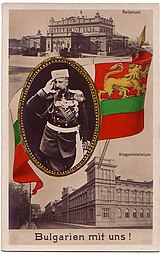Armistice of Salonica


TheArmistice of Salonica(also known as theArmistice of Thessalonica) was the armistice signed at 10:50 p.m. on 29 September 1918 betweenBulgariaand theAllied Powersat the General Headquarters of the Allied Army of the Orient inThessaloniki.The armistice came into force at noon on 30 September 1918.[1]The armistice would remain in effect until the conclusion of theTreaty of Neuilly-sur-Seine,the final general peace treaty, in November 1919.
The Kingdom of Bulgaria entered World War I on the side of the Central Powers on 14 October 1915, invading and occupying parts of Serbia. However, Bulgarian forces would struggle against the Vardar offensive launched by the Allies in September 1918, causing part of the Bulgarian Army to collapse, and an open mutiny of rebellious troops who proclaimed a republic atRadomir.[2]The Bulgarian government then requested aceasefireon 24 September. The terms included the withdrawal of Bulgarian forces in occupied areas and demobilization of most of Bulgaria's army.[1]
Surrender
[edit]The armistice effectively ended Bulgaria's participation inWorld War Ion the side of theCentral Powersand came into effect on the Bulgarian Front at noon on 30 September. The armistice regulated the demobilization and the disarmament of the Bulgarian armed forces.
The signatories were, for the Allies, French GeneralLouis Franchet d'Espérey,commander of theAllied Army of the Orient,and a commission appointed by the Bulgarian government, which was composed of GeneralIvan Lukov(member of the Bulgarian Army headquarters),Andrey Lyapchev(cabinet member) andSimeon Radev(diplomat).
Its importance was described by German EmperorWilhelm IIin his telegram to Bulgarian TsarFerdinand I:"Disgraceful! 62,000 Serbs decided the war!"[3][4]
On 29 September 1918, theOberste Heeresleitung(German Supreme Army Command) informed Wilhelm and theGerman Chancellor,CountGeorg von Hertling,that Germany's military situation was hopeless.[5]On 14 October 1918, theAustro-Hungarian Empireasked for an armistice, and on 15 October 1918TurkishGrand vizierAhmed Izzet Pashasent a captured British general,Charles Vere Ferrers Townshend,to the Allies to seek terms for anarmistice.
Terms
[edit]The terms called for the immediate demobilization of all Bulgarian military activities. It ordered the evacuation of Bulgarian-occupied Greek and Serbian territories, placed limits and restrictions to the size of Bulgaria's military employment and required Bulgaria to return military equipment that had been taken from the GreekFourth Army Corpsduring the Bulgarianoccupation of Eastern Macedoniain 1916. German and Austrian-Hungarian troops were to leave Bulgaria within four weeks. Bulgaria and especially Sofia were not to be occupied, but the Allies had the right to occupy some strategic points temporarily and to transfer troops over Bulgarian territory.
According to Article 5, about 150,000 Bulgarian soldiers to the west of theSkopjemeridian were to be delivered to the Entente as hostages.[6]
The French would send troops to Romania and the British and Greeks to European Turkey, which was still at war with the Allies.
The armistice would remain in effect until the conclusion of theTreaty of Neuilly-sur-Seine,the final general peace treaty, in November 1919.
References
[edit]- ^abArchives, The National (2018-09-28)."The National Archives - Milestones to peace: the Armistice of Salonica".The National Archives blog.Retrieved2023-08-28.
- ^Tucker (1996), p. 151.
- ^"The Battle of Dobro Polje – The Forgotten Balkan Skirmish That Ended WW1 | Militaryhistorynow.com".Archived fromthe originalon 2017-09-23.Retrieved2019-11-21.
- ^"The Germans Could no Longer Keep up the Fight | historycollection.co".22 February 2017.Retrieved2019-11-21.
- ^Axelrod 2018,p. 260.
- ^Dimitrova, Snezhana."Bulgarian Prisoners of War and Prisoners of War in Bulgaria (1915-1918): Law, Practices and Everyday Life. In: Mustafa Daş at al. First World War Centenary. Symposium Papers Book. Izmir; Dokuz Eylül University, 2015, pp. 443-463. ISBN 978-975-441-445-5".In: Mustafa DAŞ et al. 100. YILINDA BİRİNCİ DÜNYA SAVAŞI. DOKUZ EYLÜL ÜNİVERSİTESİ, 2015, pp. 443-463.
Sources
[edit]This article includes a list of generalreferences,butit lacks sufficient correspondinginline citations.(September 2015) |
- (1919) "Bulgaria Armistice Convention, September 29th, 1918".The American Journal of International Law Vol. 13 No.4 Supplement: Official Documents,402-404.
- Axelrod, Alan(2018).How America Won World War I.Rowman & Littlefield.ISBN978-1493031924.
See also
[edit]- 1918 in Greece
- World War I treaties
- Bulgaria in World War I
- Treaties concluded in 1918
- Treaties entered into force in 1918
- Treaties of the Kingdom of Bulgaria
- Armistices
- 1918 in Bulgaria
- Macedonian front
- Treaties of the United Kingdom (1801–1922)
- Modern history of the Balkans
- Thessaloniki in World War I
- 1918 establishments in Bulgaria
- Bulgaria–France relations
- Bulgaria–United Kingdom relations
- September 1918 events


